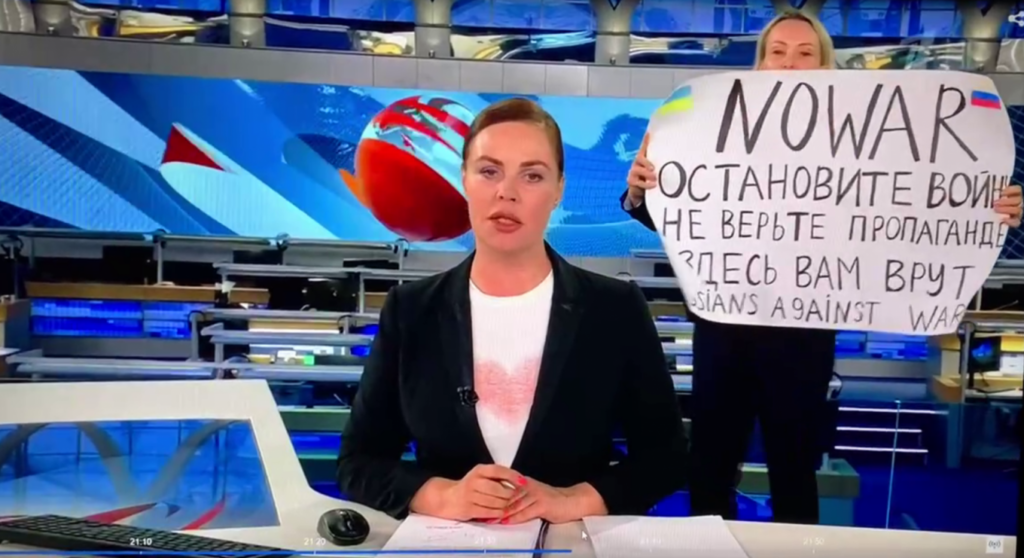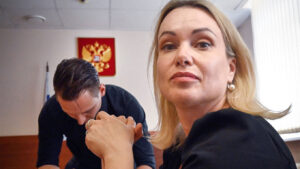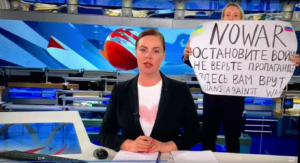
STRATEGIC ASSESSMENT. A former Russian state television producer has been fined on charges of “discrediting” the Russian military, the state-run RIA Novosti news agency reported Thursday.
Marina Ovsyannikova, 44, became famous for protesting the war in Ukraine on a live newscast by her former employer, Channel One, in March. Prosecutors say the journalist “discredited” the Russian Armed Forces during the July 13 trial of opposition activist Ilya Yashin, where she and other journalists and activists had turned up in his support.
Moscow’s Meshchansky District Court ordered Ovsyannikova to pay 50,000 rubles ($816) in fines for the administrative offense.
Ovsyannikova allegedly “discredited” the army during an interview she gave outside the court building, according to court proceedings seen by the SOTA Telegram news channel. The clip used in proceedings was published by pro-government YouTube blogger Ilias Mercury, SOTA reported.

“I actively speak out against the war, I think it is the most horrific crime of the 21st century. I am firmly convinced that these criminals will be sitting on the defendants’ dock at an international tribunal. What they are doing in Ukraine now is madness, it is an aggressive attempt at holding on to power. I am sure the good will win over the evil,” she says in a clip from the interview.
Ovsyannikova mentioned in the same interview that she has not paid the fine for her previous offense — the on-air protest — “out of principle,” as she is convinced the money from the fine would be used “to pay for the war.”
Russia passed the law against “discrediting” the military shortly after it sent troops into Ukraine. Since then, a growing number of people have been prosecuted under the law, which Kremlin critics say is an effort to stifle anti-war dissent.

Despite staging a number of anti-war protests, Ovsyannikova has not yet faced criminal prosecution in Russia. She was briefly detained earlier this month just days after staging a solo anti-war protest outside the Kremlin.
Marina Ovsyannikova was briefly detained in Moscow on Sunday evening after a July 15 social media post showed her standing in front of the Kremlin with a poster reading “How many more children must die [in Ukraine] before you stop?”
She was stopped by police officers near her home as she went for a walk with her two dogs, she told The Moscow Times.

“I was ready for this scenario, but I didn’t expect this to happen near my house; now I’m afraid to leave it,” she told The Moscow Times in a phone interview.
The journalist said she was released three hours later and was charged with “discrediting” the Russian army during last week’s trial of opposition politician Ilya Yashin, where she had joined activists who gathered there in his support.
“When I left the police department, they [police officers] told me that ‘my fun has just begun’ and this is not the last time we’ll meet,” Ovsyannikova said.
“They hadn’t disturbed me for the time being, but apparently their patience has run out and I will face more serious things,” she added.
Ovsyannikova now faces a fine of up to 50,000 rubles ($900) under the administrative charges of discrediting the military’s actions and will go on trial on July 21, her lawyer Dmitry Zakhvatov told The Moscow Times.
“Usually in such cases, courts impose a fine, but it’s difficult to assess the risks in the long run — it depends on the will of the authorities and it’s hard to imagine what’s on their minds,” Zakhvatov added.
Russian authorities have not yet announced any criminal investigations against Ovsyannikova for her anti-war activities.
But Ovsyannikova herself said she doesn’t rule out new charges for the July 15 protest.
Following Moscow’s full-scale invasion of Ukraine, the country adopted laws imposing prison sentences of up to 15 years for “discrediting” Russia’s military or spreading information about the Russian army deemed false by authorities.
The journalist returned to Russia earlier this month to be with her children after a brief stint at the German newspaper Die Welt.
Russia’s opposition as well as many Ukrainians said her anti-war protest rang hollow due to her years of working for Channel One, while pro-Kremlin figures accused her of cooperating with foreign governments.
Ovsyannikova said she’s taking advantage of this situation while she can. “They [Russian authorities] are trying to denigrate me and to make me look like a Kremlin agent, so they haven’t disturbed me so far. Since I’m back in Russia, I’m using it as an opportunity to express my anti-war position — but we’ll see what happens next,” she told The Moscow Times.
Since the start of Russia’s invasion at the end of February, state-run television channels — the main news source for roughly two-thirds of Russians — have gone into overdrive to ensure that the Kremlin’s messaging reaches all across the country.
Former and current state journalists who spoke to The Moscow Times described more news shifts, longer hours and tightened restrictions in the four months since the war began.
Ovsyannikova was one of dozens of staff at state television channels who quit in the first weeks of the war, but this wave of resignations has since ground to a halt as channels offered better pay packages and imposed stricter broadcasting controls.
Since her public protest, Ovsyannikova has been attacked by journalists and public figures for both her previous work within the Kremlin’s propaganda machine and her pro-Kyiv comments, which some consider insincere.
For those still working in Russian state television, her case is far from inspiring.
“When journalists are urged to quit [state-run media] and go to protests — [I ask] okay, but what’s next? Who will pay our loans and mortgages if we proudly leave our job? Moreover, I can honestly say that people look at Marina Ovsyannikova’s case and how she is being endlessly criticized by everyone after quitting — and they don’t want to resign,” said a Channel One employee who asked to remain unidentified for fear of losing her job.
Ovsyannikova herself believes many more state television employees would have quit if her protest and subsequent statements had enjoyed a more positive reception.

“I think that 90% of state media employees don’t support what’s going on in Ukraine,” Ovsyannikova told The Moscow Times. “If there was an alternative, everyone would leave.”
One reason to stay, however, was likely to have been pay increases introduced at several major television channels in the wake of the invasion.
Salaries for news journalists at state-run Channel One were raised 20% in June to help retain staff, the Channel One employee told The Moscow Times. Employees at state-run Rossiya 1 also got a pay raise, according to a Rossiya 1 journalist who spoke to The Moscow Times on condition of anonymity.
Channel One and Rossiya 1 are the country’s two biggest television channels and have a combined audience of tens of millions.
“I was thinking about quitting, but money was important. I hoped peace talks [between Russia and Ukraine] would achieve some results. Plus, our management talked to us, calmed us down, and said we should think about ourselves,” the Rossiya 1 journalist said.
Since the start of the invasion, Russian state media has been faithfully relaying the Kremlin narrative that the war is meant to liberate Ukrainians from Nazis that it falsely claims are running the government in Kyiv.
Pundits and presenters on state television channels often use genocidal rhetoric, or mock evidence that Russian soldiers have carried out looting, and engaged in the rape and execution of Ukrainian civilians.
“We are at war with Satanists,” said one guest on a popular talk show earlier this month
The volume of such material – and the corresponding amount of work expected from staff – has increased since the start of the invasion when channels ramped up news coverage. Before the war, Channel One had a news bulletin every three hours – they are now hourly.
Extra news coverage has also been required to fill airtime left after entertainment shows – including Channel One’s popular talk show Vecherny Urgant (“Evening Urgant”) and dating program Davai Pozhenimsya (“Let’s Get Married”) – were suspended in February.
“The number of news shifts and people who work [in the newsroom] has increased. Journalists are often asked to work extra shifts,” said the Channel One employee.
The state TV journalists who spoke to The Moscow Times said they had been ordered to cite only official Russian sources and that the war in Ukraine must only be referenced on air using the Kremlin’s preferred term of a “special military operation.”
“We cannot use Ukrainian sources, even official ones,” said the Rossiya 1 journalist. “The channel has a big meeting once a week and a daily morning meeting. Every day our management tells us how to cover certain events, or which stories we won’t cover at all. Some instructions are also given during the day,”
Natalia Peshkova quit her job as a documentary journalist at Channel One a month after the invasion in protest at the war and became a freelancer.
“Many see it as a job that has to be done,” she told The Moscow Times of the atmosphere in state media newsrooms. “You cannot change anything or you don’t have enough courage and motivation, so you adjust to the situation.”
She recounted an incident after the start of the war when managers rejected a documentary film about Ukrainian history that her department had made. “The bosses called them and yelled, accusing them of pacifism — as if pacifism is a bad thing,” she said.

Another wartime change at state-owned TV channels has been a tightening of control. In particular, programs are no longer broadcast live – a measure to ensure that on-air protests, like that carried out by Ovsyannikova, cannot be repeated.
Channel One is currently using a broadcasting delay of up to 60 seconds, according to the journalist who works at the channel.
The Rossiya 1 journalist said that only employees who pass security checks are given access to live broadcasts and social media accounts – another likely result of attempts to avoid a repeat of an Ovsyannikova-style protest.
The changes at state-owned television channels come as Russia has introduced new laws effectively criminalizing objective reporting, resulting in hundreds of independent journalists fleeing the country and the shuttering of major independent outlets.
At least 3,000 websites and independent media have been blocked or censored since the start of the fighting, according to online freedom organization Roskomsvoboda. Russia’s ranking on the World Press Freedom Index fell last month to 155th out of 180 countries.
Many of the journalists working at state-owned TV channels are well aware of their role in broadcasting deliberate falsehoods and distorted narratives.
“We understand what kind of picture we show and how it is made up, what subtext it has. Of course [state television] channels are deceiving people,” said the Rossiya 1 journalist.
Ovsyannikova was despondent about the prospects for other staff at state media quitting because of the stigma now attached to working at such organizations.
“For people who support [President Vladimir] Putin, they will always be traitors. For others, they will be former propagandists,” she said. (Moscow Times)





